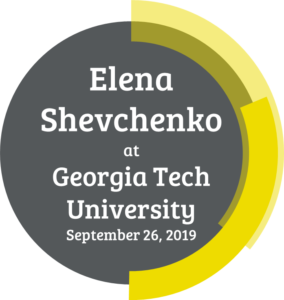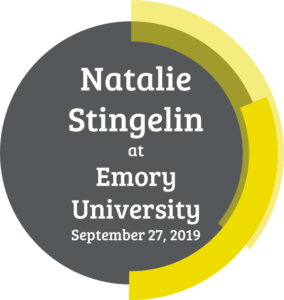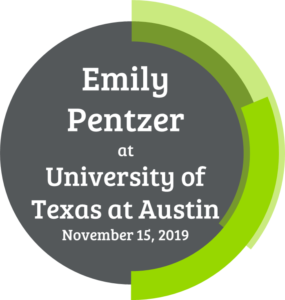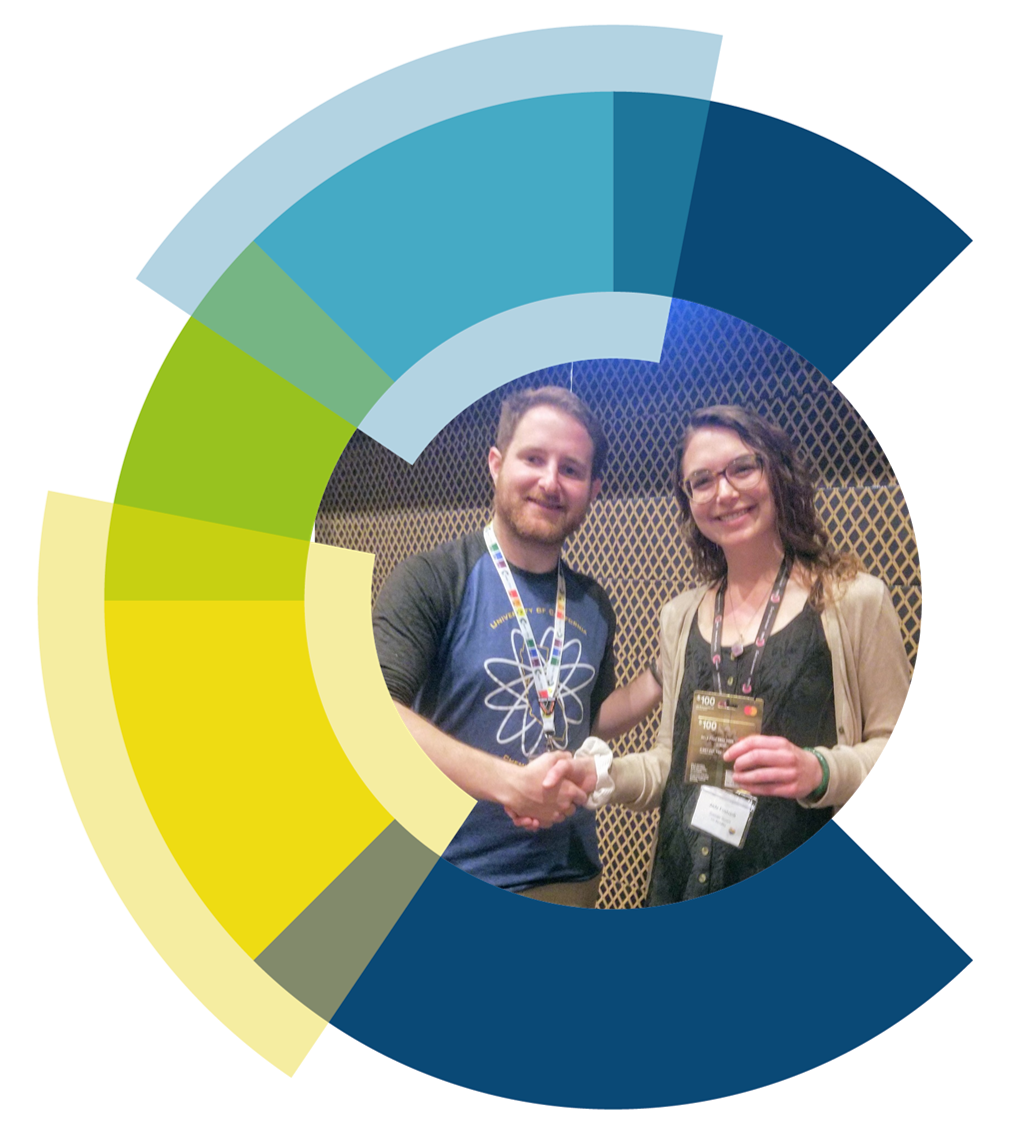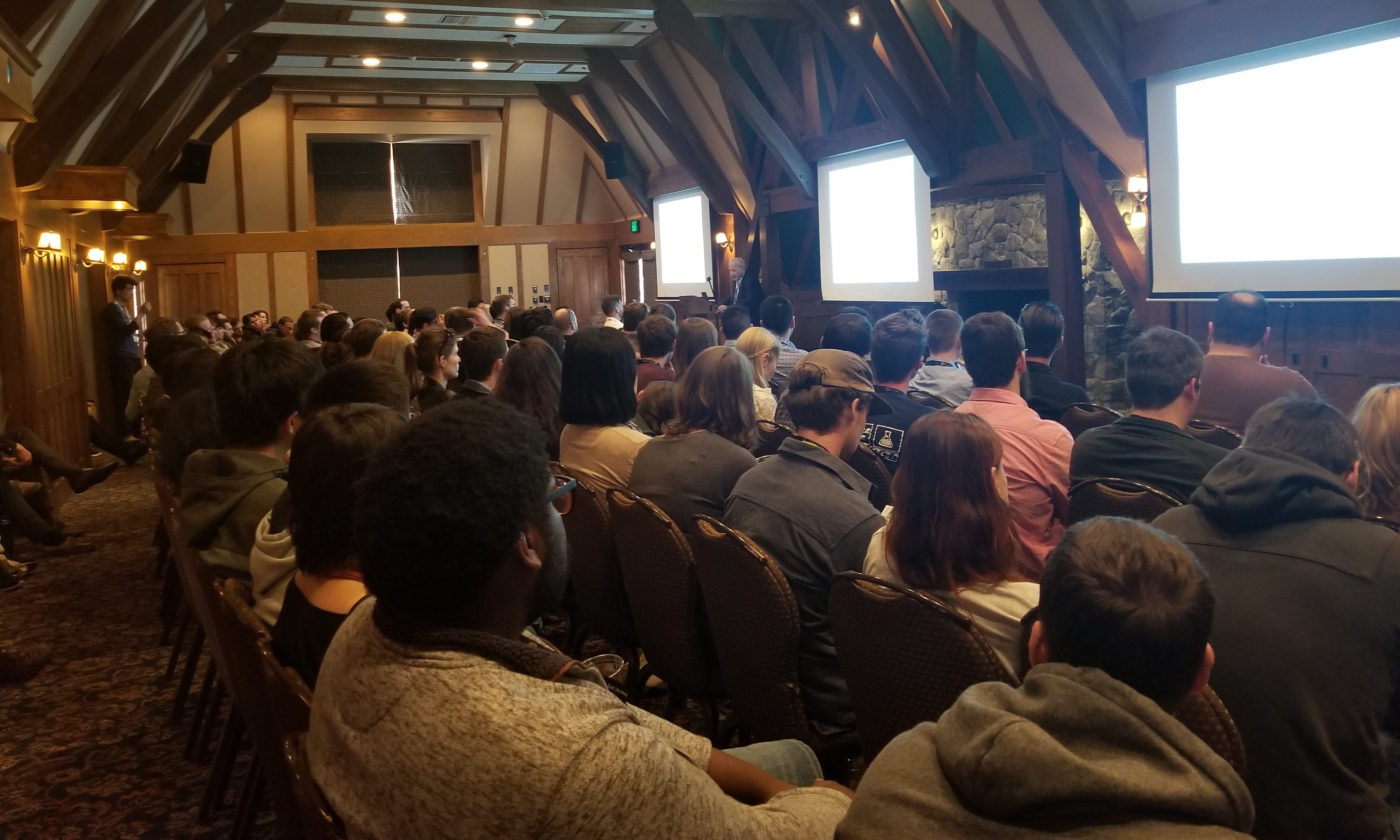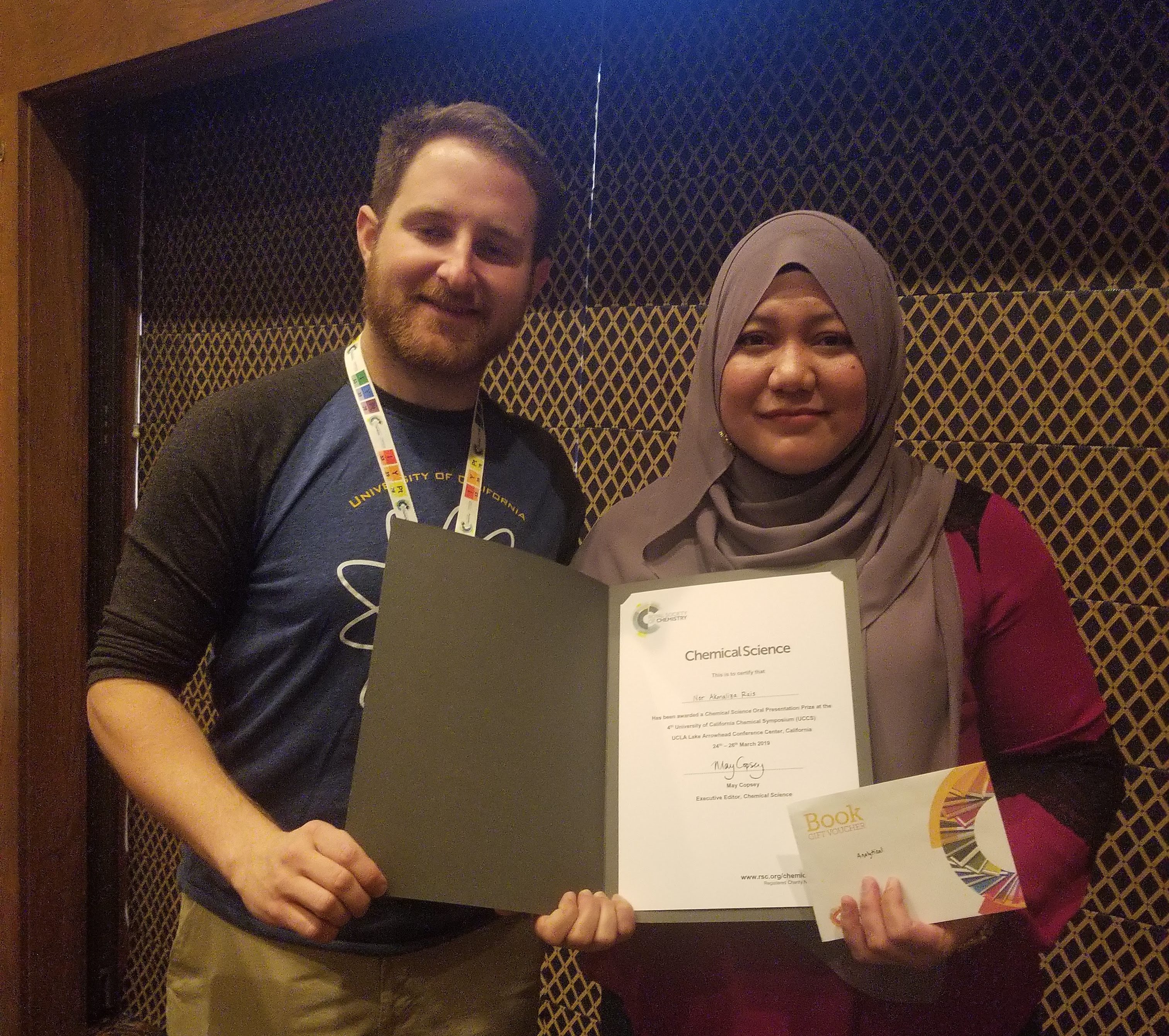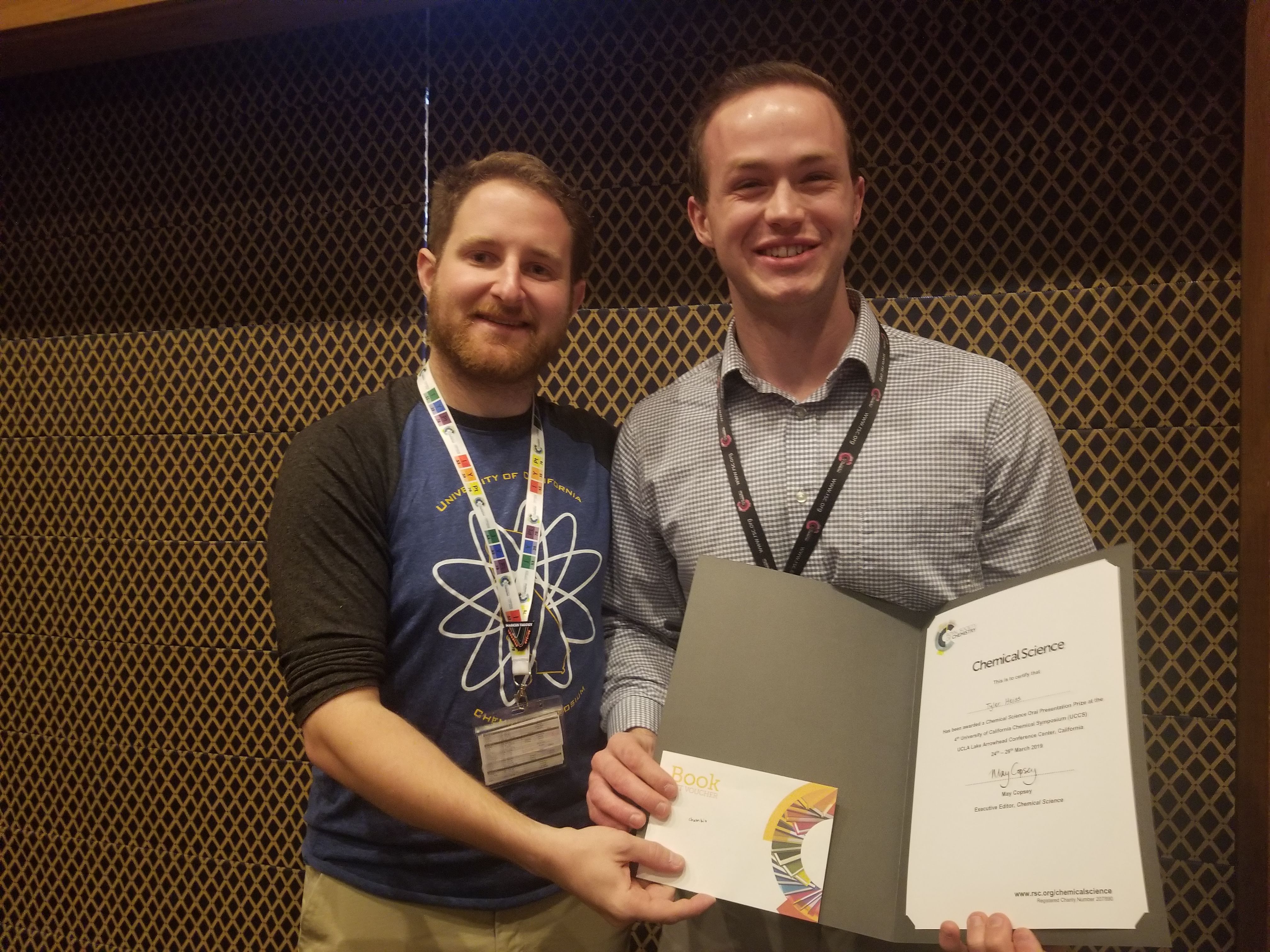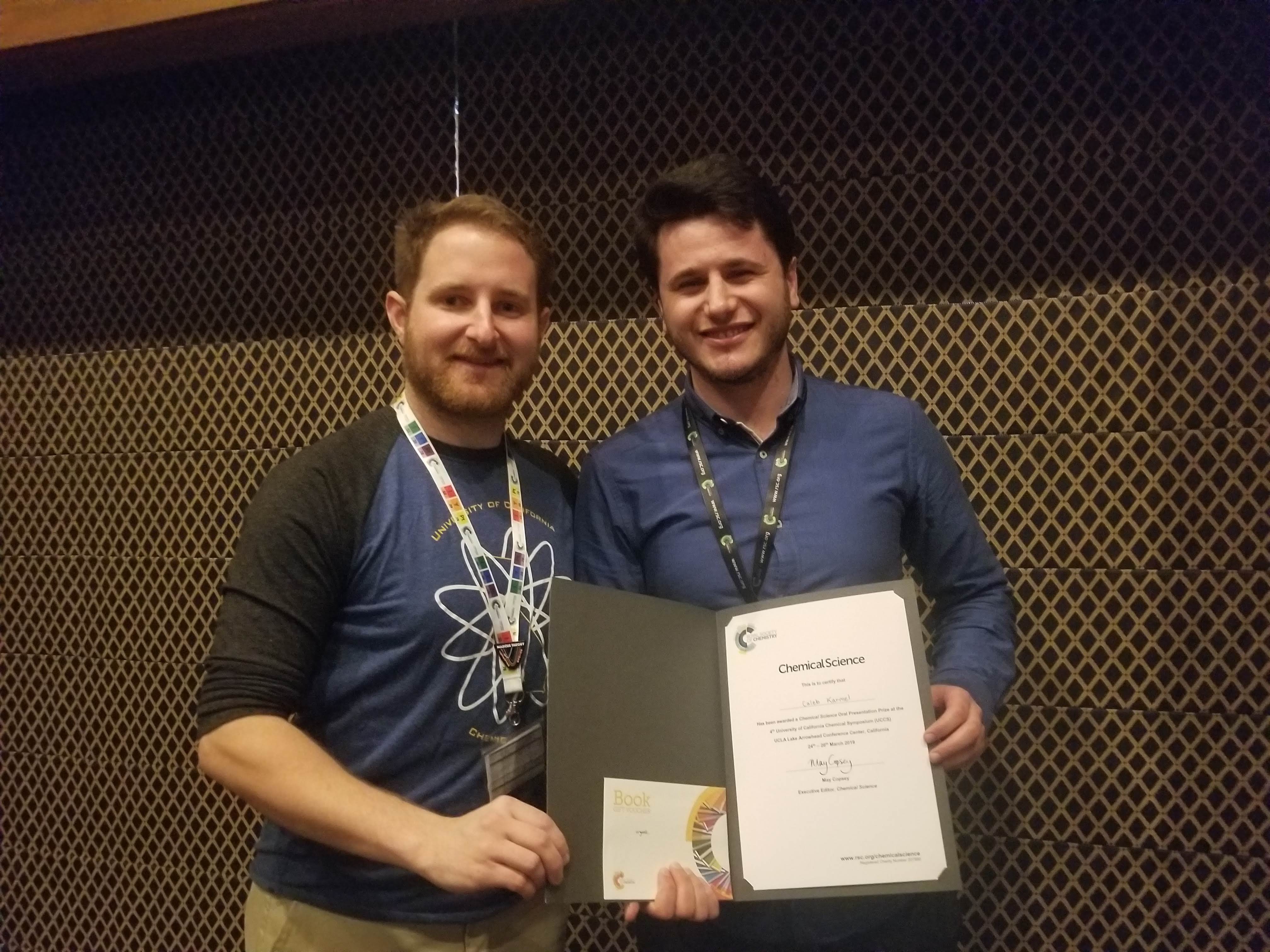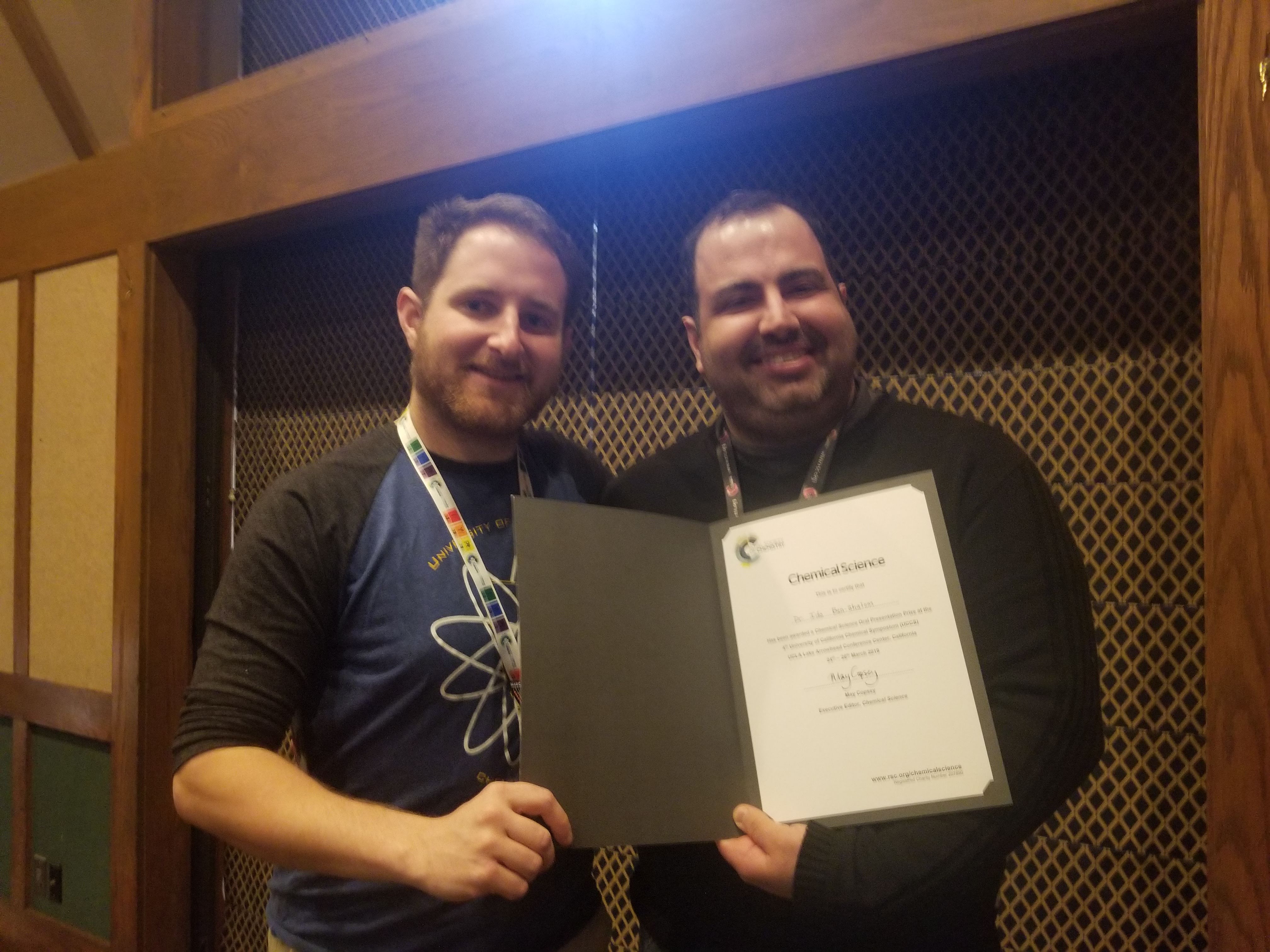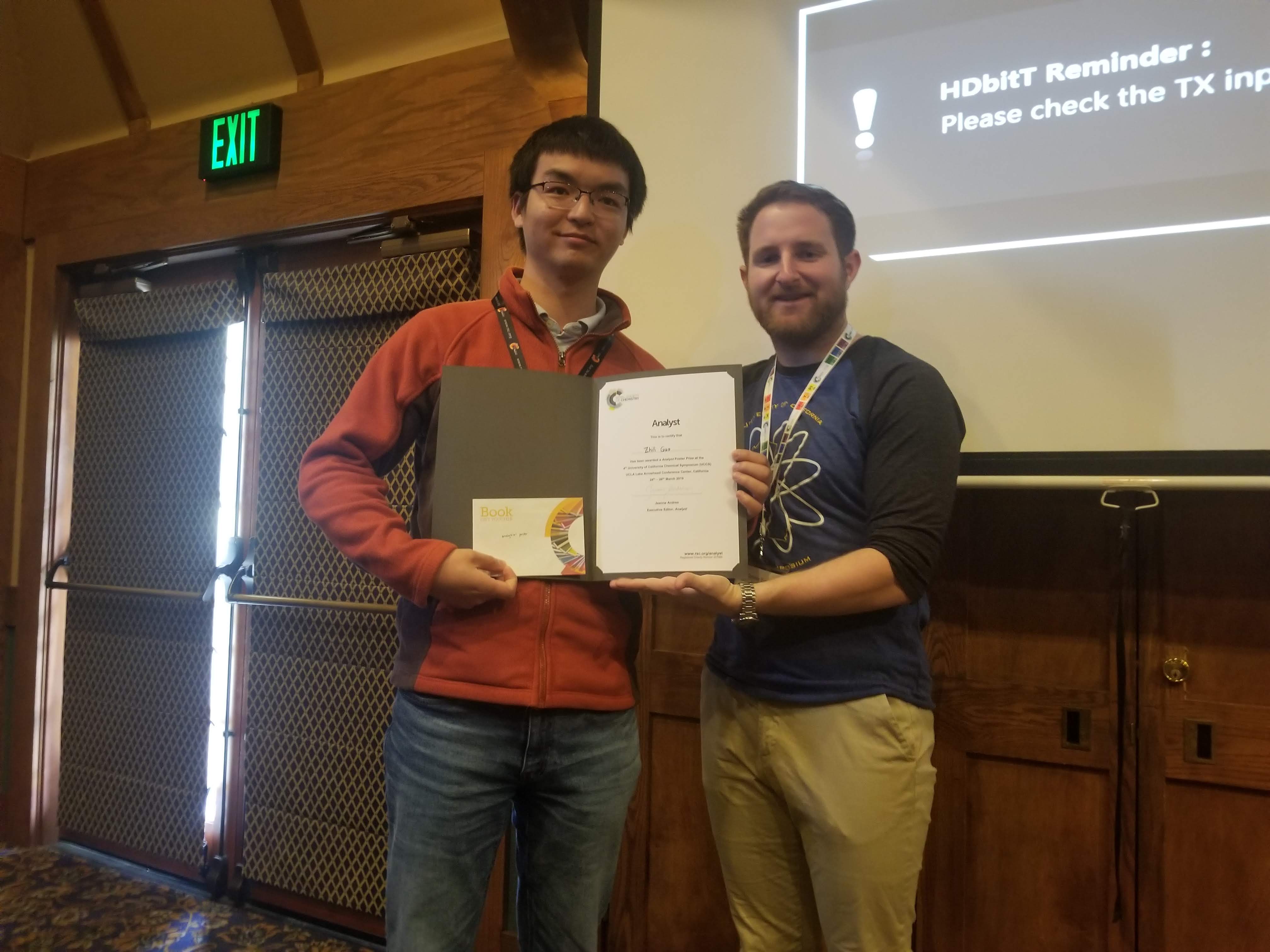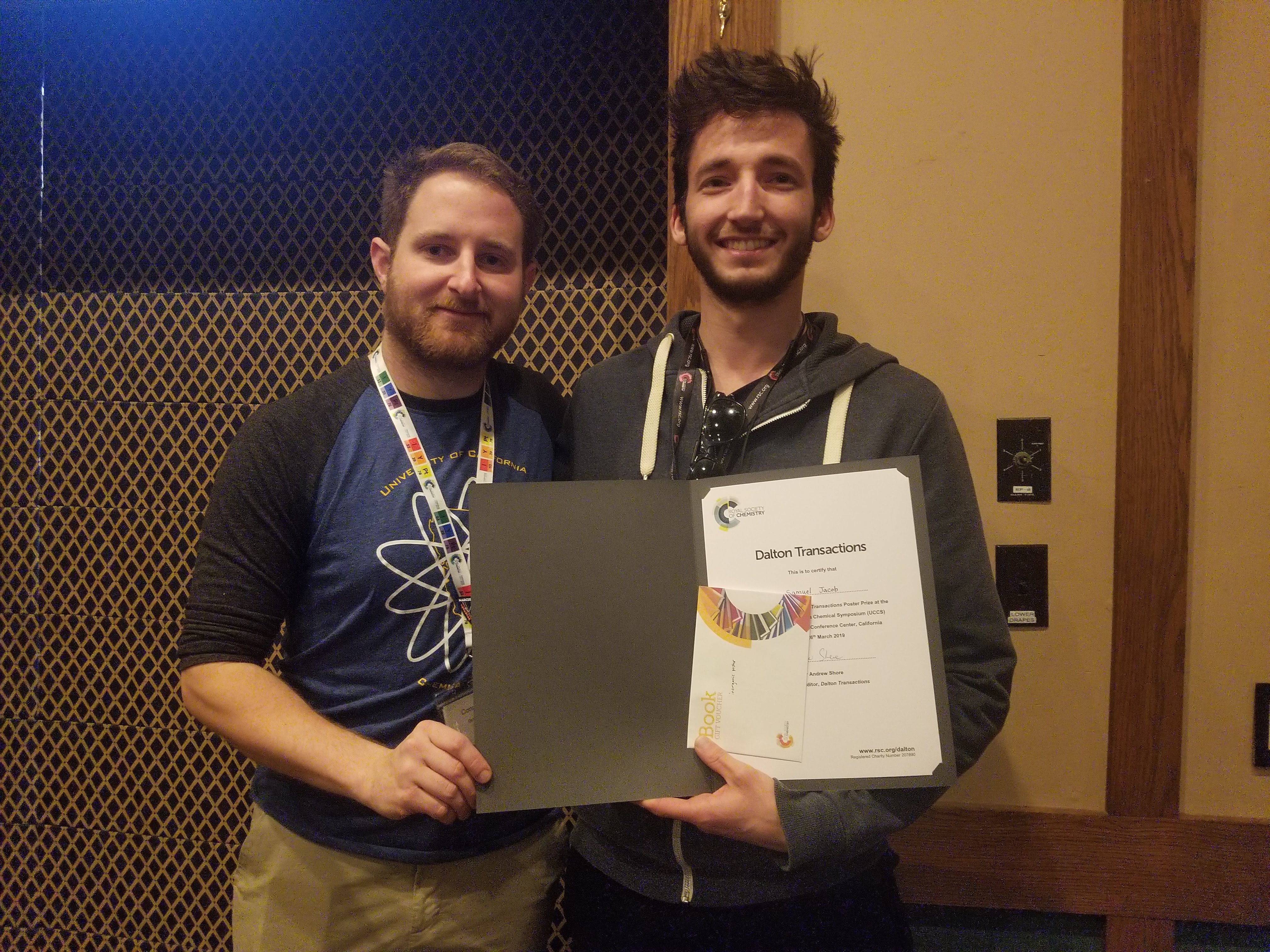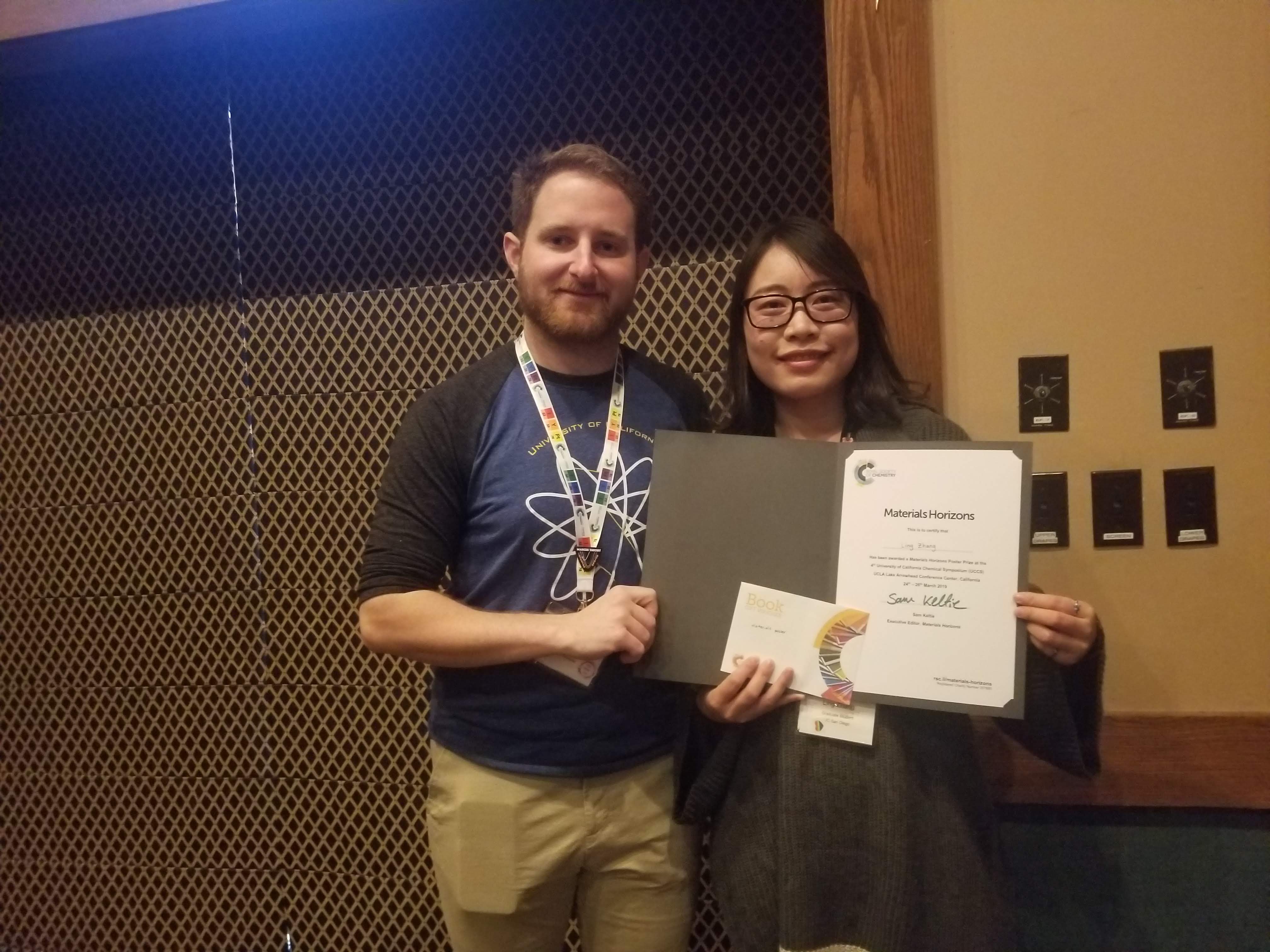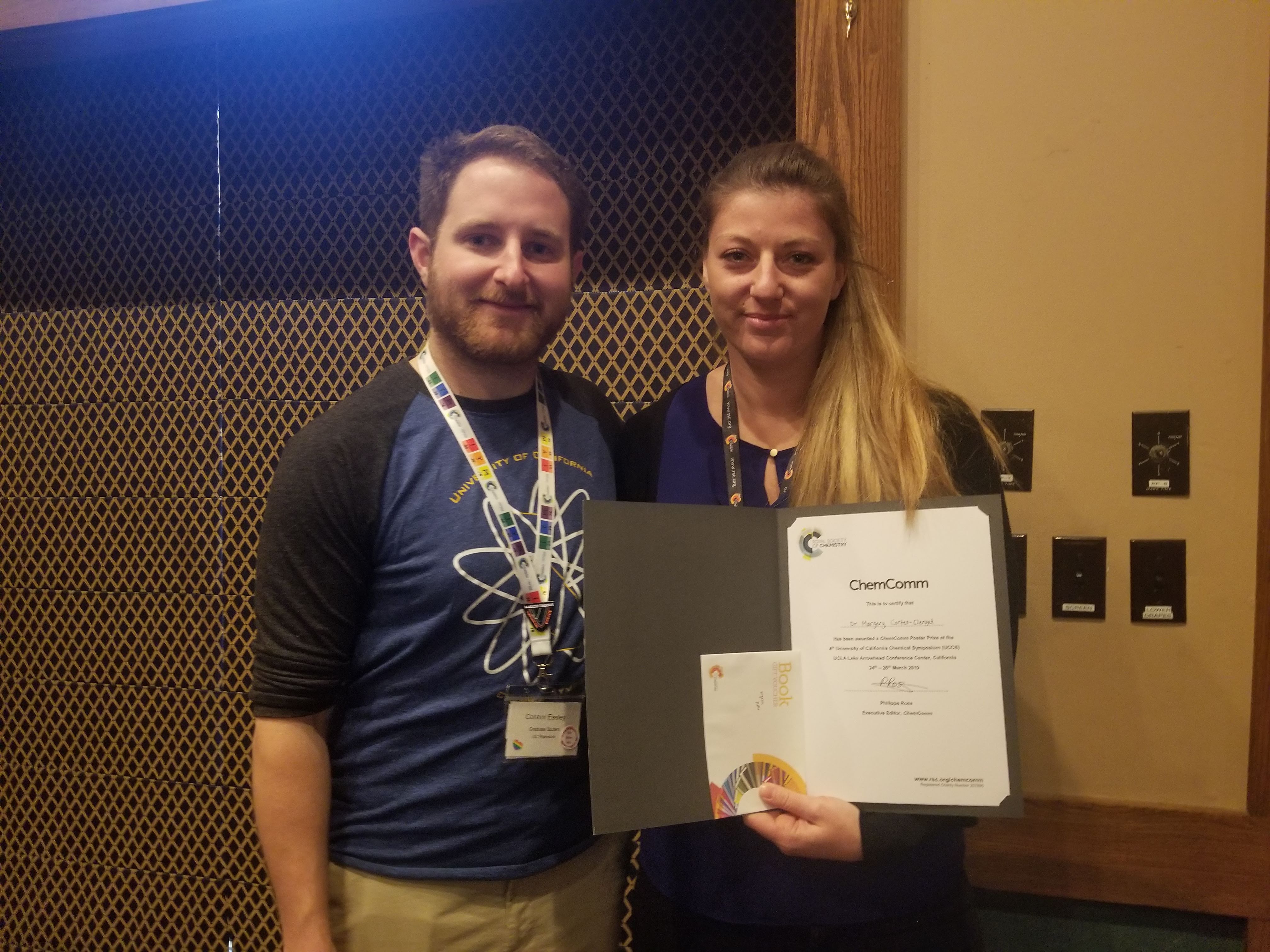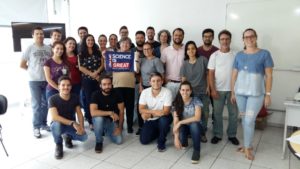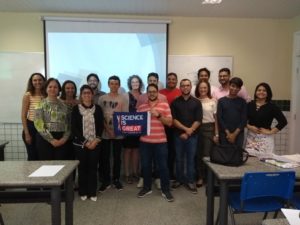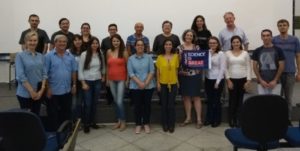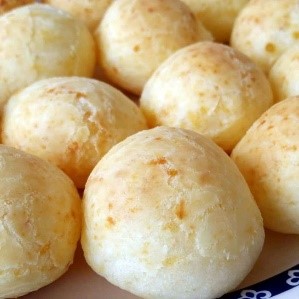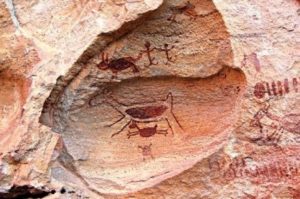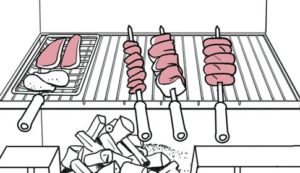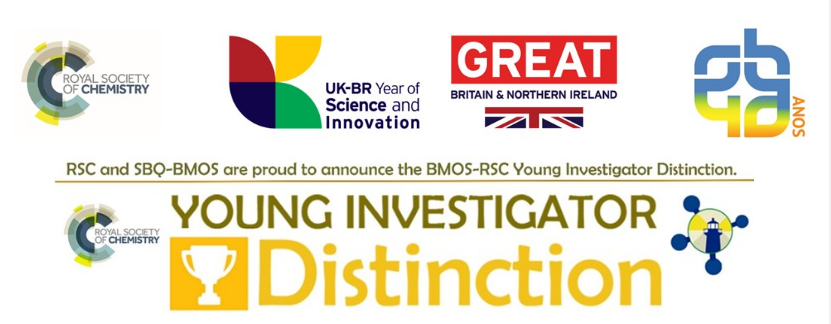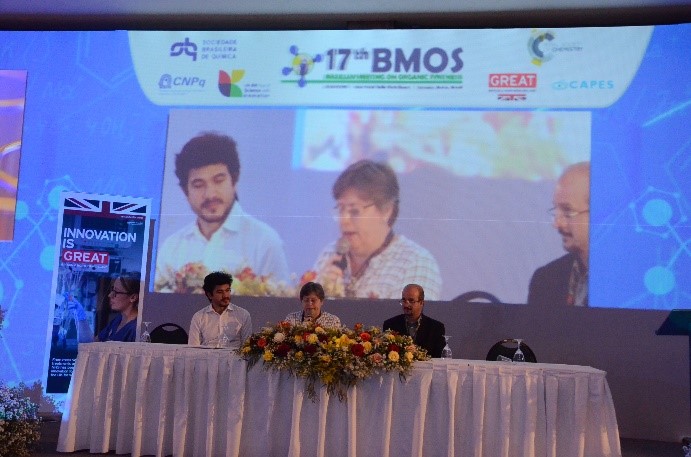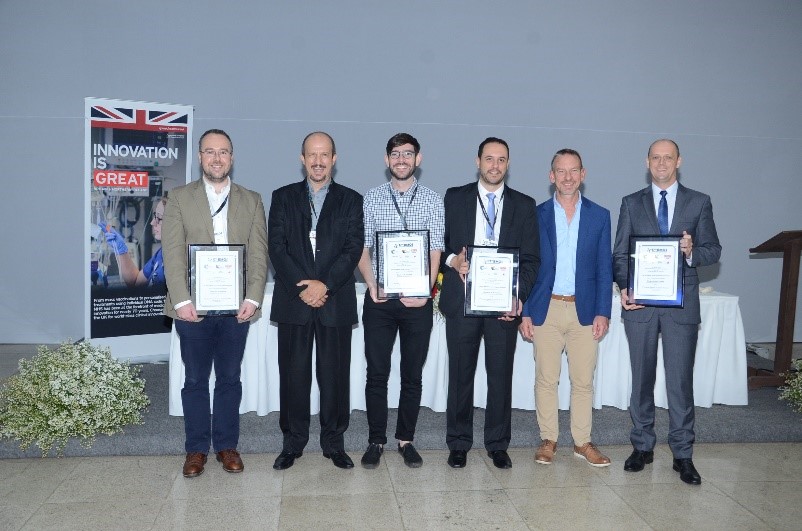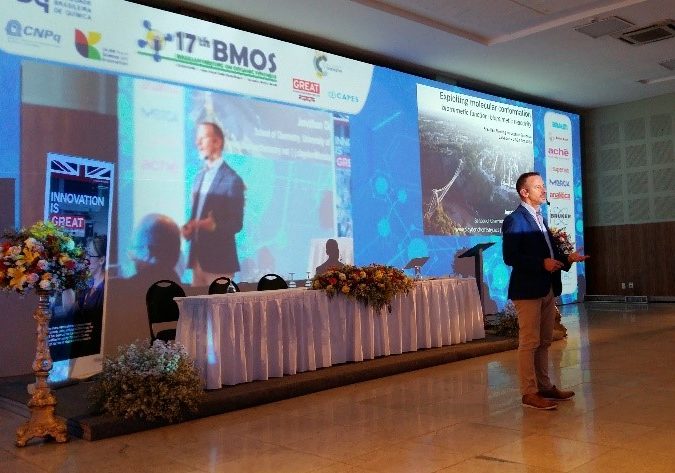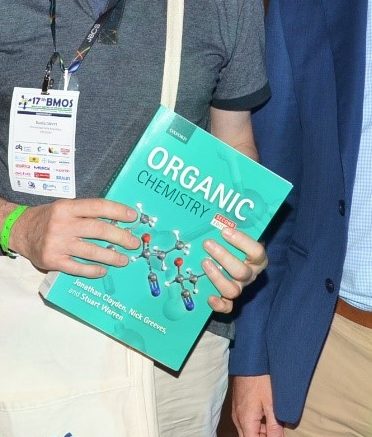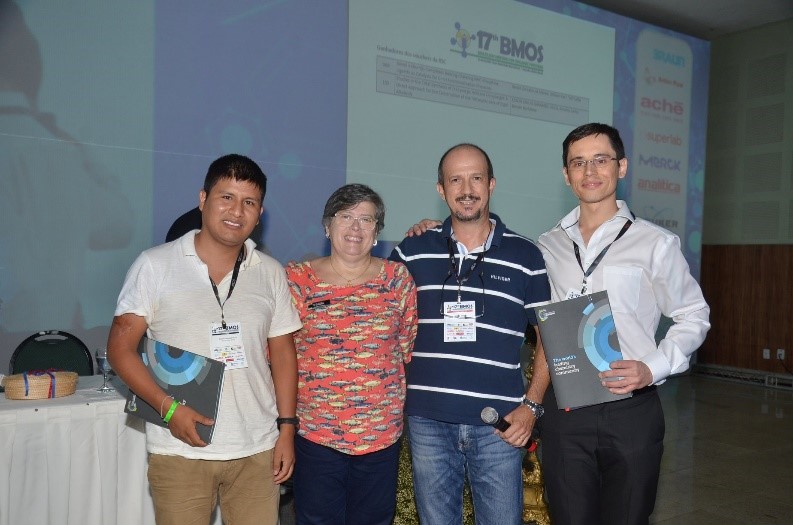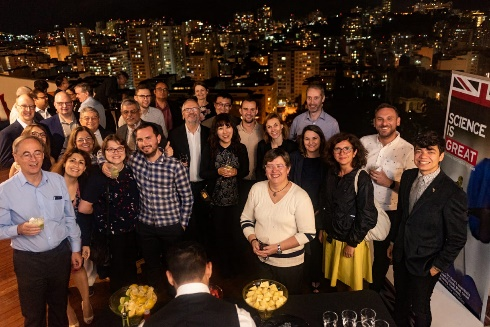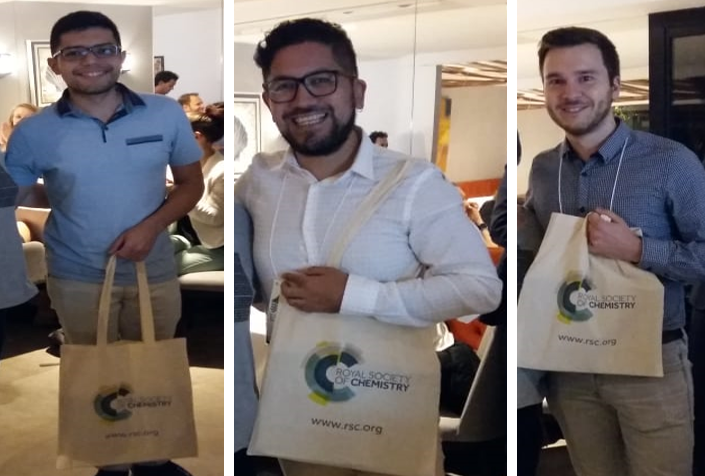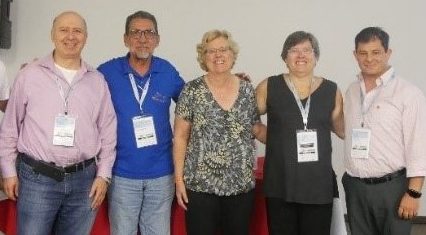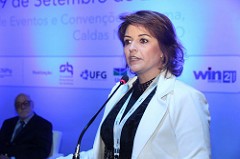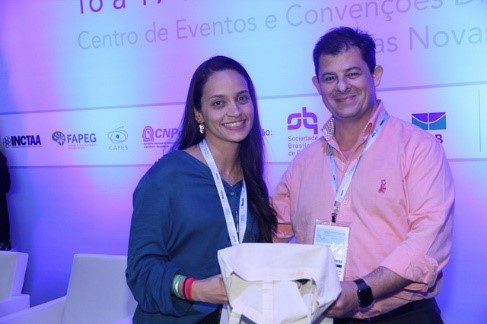Royal Society of Chemistry Prizes and Awards
Do you know an outstanding chemist who deserves recognition? This is your chance to raise awareness of those who are making a positive impact in the chemical sciences. The Royal Society of Chemistry aims to use our international platform to showcase outstanding researchers from all areas of the chemical sciences through a variety of awards and prizes. There are over 60 awards and prizes that are now accepting nominations for 2020, including team awards that allow self-nomination.
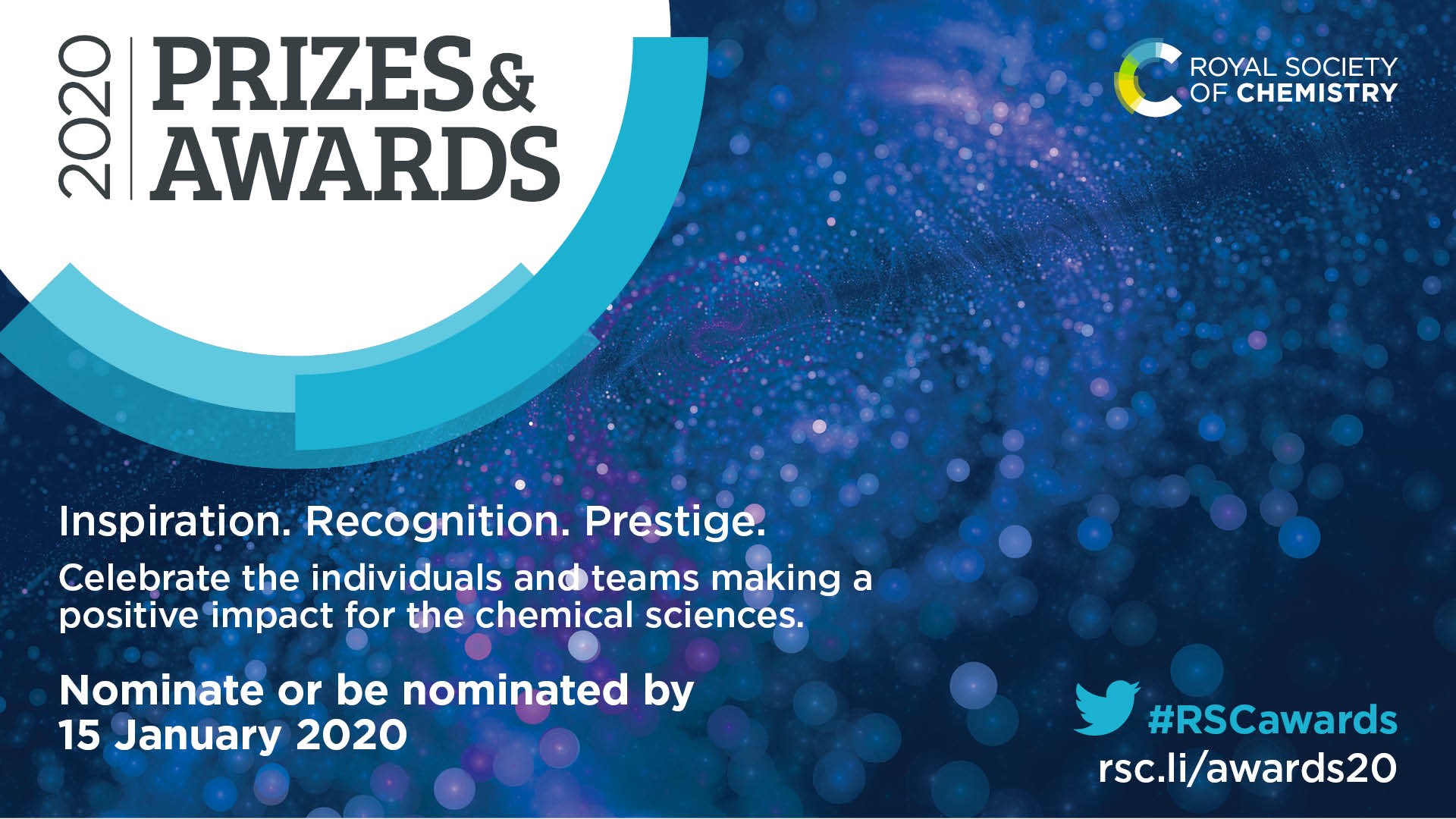
We recognize the importance of valuing all members of our community and as a professional body and voice for the chemical science community, we believe that we have a responsibility to promote inclusivity and accessibility in order to improve diversity. In line with our commitment to support diversity and inclusion, it is important for nominators to note that the guidelines for the number of years since completing a PhD are suggestions rather than rigid boundaries. We understand that some of the most deserving nominees may have had challenging or unusual career paths, and aim to recognize researchers and educators from a wide variety of backgrounds including those who have taken non-traditional career paths. We don’t require that nominators be senior researchers, and encourage people from all career levels to nominate their peers and colleagues and tell us about the people who you feel have made a difference.
Lectureships to Recognize Early- and Mid-Career Researchers
In addition to RSC-wide awards, several of our high-quality journals present lectureships to researchers in various stages of their careers. The winners of these awards are nominated by members of their community and carefully considered by the journal Editorial Boards. Not only are publications and citations considered as factors in the decision, but also engagement with and service to the community. Make sure to nominate colleagues before the deadlines, summarized here, and you can find more information about each of these below.
ChemComm Emerging Investigator Lectureship 2020

The ChemComm Emerging Investigator Lectureship recognizes emerging scientists in the early stages of their independent academic career. Eligible nominees should have completed their PhD in 2012 or later but appropriate consideration will be given to those who have taken a career break or followed a different study path. The recipient of the lectureship will be invited to present a lecture at three different locations over a 12-month period, with at least one of these events taking place at an international conference. The recipient will receive a contribution of £1500 towards travel and accommodation costs for their lectures, as well as a certificate. The recipient will be asked to contribute a review article for the journal.
Learn more and submit your nomination. The nomination deadline is November 29th, 2019.
ChemSocRev Pioneering Investigator Lectureship 2020
 The ChemSocRev Pioneering Investigator Lectureship recognizes mid-career scientists who have firmly established themselves in their independent careers, continuously publish innovative work, and have pioneered several research areas. Eligible nominees should have completed their PhD between January 2004 and December 2011, but appropriate consideration will be given to those who have taken a career break or followed a different study path. The recipient of the lectureship will be invited to present a lecture at three different locations over a 12-month period, with at least one of these events taking place at an international conference and will receive a contribution of £1500 towards travel and accommodation costs for their lectures, as well as a certificate. The recipient will also be asked to contribute a review article for the journal.
The ChemSocRev Pioneering Investigator Lectureship recognizes mid-career scientists who have firmly established themselves in their independent careers, continuously publish innovative work, and have pioneered several research areas. Eligible nominees should have completed their PhD between January 2004 and December 2011, but appropriate consideration will be given to those who have taken a career break or followed a different study path. The recipient of the lectureship will be invited to present a lecture at three different locations over a 12-month period, with at least one of these events taking place at an international conference and will receive a contribution of £1500 towards travel and accommodation costs for their lectures, as well as a certificate. The recipient will also be asked to contribute a review article for the journal.
The 2019 ChemSocRev Pioneering Investigator Lectureship was awarded to Professor Yujie Xiong from the University of Science and Technology of China this past summer. Prof Xiong presented his lecture at the International Symposium on Energy Conversion and Storage Materials Conference 2019 in Brisbane, Australia on July 31st, 2019, at the European Research Society 2019 Fall meeting in Warsaw, Poland on September 17th, 2019, and the his third lecture will soon be determined.
Learn more and submit your nomination. The nomination deadline is November 29th, 2019.
Biomaterials Science Lectureship
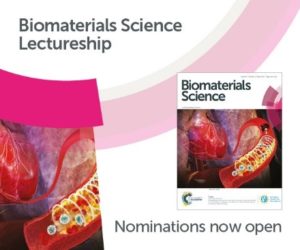
Coinciding with the presentation of the 2019 Biomaterials Science Lectureship to Professor April Kloxin from the University of Delaware at the European Society for Biomaterials Meeting in September 2019, nominations for the for the 2020 Biomaterials Science Lectureship were opened and will be accepted through November 30th 2019. We are pleased to congratulate Prof Kloxin for winning the 2019 award and to recognize her achievement in advancing the field. The winner of the 2020 Biomaterials Science Lectureship, which will be announced in April 2020, will be asked to present a lecture at the 11th World Biomaterials Congress, taking place in Glasgow in May 2020. The recipient will also be asked to contribute a lead article to the journal and will have their work showcased free of charge on the front cover of the issue in which their article is published.
This annual award was established in 2014 to recognize an early-career researcher who has made a significant contribution to the field of biomaterials science. Candidates should be independent researchers who are at an early stage of their independent career; this is typically within approximately 12 years of attaining their doctorate or equivalent degree, but appropriate consideration will be given to those who have taken a career break, for example for childcare leave, or followed an alternative study path. Nominators do not have to be senior researchers and nominations from community members at all levels are encouraged. Candidates will be notified of their nomination and asked to provide three recent articles that reflect their current research. They will be assessed by a shortlisting panel made up of Biomaterials Science Advisory Board members as well as a previous lectureship winner. The shortlisted candidates will be assessed by the journal’s Editorial Board and selected using an anonymous poll.Selection is not based simply on quantitative measures. Consideration will be given to all information provided in the letter of recommendation and candidate CV, including research achievements and originality, contributions to the biomaterials community, innovation, collaborations and teamwork, publication history, and engagement with Biomaterials Science.
Learn more and submit your nomination. The nomination deadline is November 30th, 2019.
Polymer Chemistry Lectureship
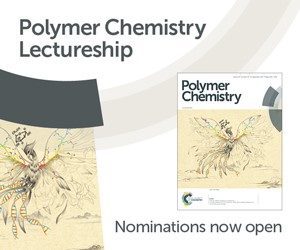
The Polymer Chemistry Lectureship was established in 2015 to honor an early-career researcher who has made significant contributions to the field of polymer chemistry. The 2019 Lectureship was awarded to Dr. Frederick Wurm from the Max Planck Institute for Polymer Research after consideration of many worthy nominations.The recipient is chosen by the Editorial Board from a list of candidates nominated by the community. Nominations are now being accepted through the end of November. Candidates should be independent researchers, having completed PhD and postdoctoral studies, actively pursuing research within the polymer chemistry field, and having made a significant contribution to the field. They should be at an early stage of their independent career, which is generally within 15 years of attaining their doctorate or equivalent degree, but appropriate consideration will be given to those who have taken a career break, for example for childcare leave, or followed an alternative study path.
The recipient of the award will be asked to present a lecture at the Warwick Polymer Meeting in 2020, where they will also be presented with the award. The Polymer Chemistry Editorial Office will provide financial support to the recipient for travel and accommodation costs. The recipient will also be asked to contribute a lead article to the journal and will have their work showcased free of charge on the front cover of the issue in which their article is published.
Learn more and submit your nomination. The nomination deadline is November 30th, 2019.
Soft Matter Lectureship
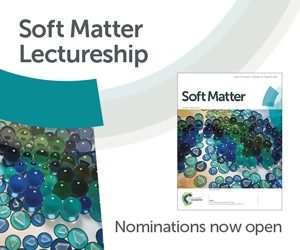
If you know an early-career researcher that you believe deserves recognition for her or his contribution to the soft matter field, the Soft Matter Lectureship is your opportunity to highlight their work to leaders in the community. Nominations for the 2020 Soft Matter Lectureship are now being accepted, since the start of September through November 30th 2019.The recipient of the award will be asked to present a lecture at an international conference in 2020, where they will also be presented with the award. The Soft Matter Editorial Office will provide financial support to the recipient for travel and accommodation costs. The 2019 Soft Matter Lectureship award was presented to Professor Tim White from the University of Colorado, Boulder. Prof White gave his lecture at the 5th International Soft Matter Conference, held in Edinburgh from June 3-7, 2019.
Candidates should be independent researchers who have completed their PhD and postdoctoral studies and actively pursuing research in the soft matter field. They should be an early stage of their independent career, generally about 12 years out from attaining their PhD, although this is, of course, only a loose guideline and nominations for candidates who have taken an alternate study or career path are welcome. Selection is not based simply on quantitative measures. Consideration will be given to all information provided in the letter of recommendation and candidate CV, including research achievements and originality, contributions to the soft matter community, innovation, collaborations and teamwork, publication history, and engagement with Soft Matter.
Learn more and submit your nomination. The nomination deadline is November 30th, 2019.
JAAS Emerging Investigator Lectureship
 The JAAS Emerging Investigator Lectureship recognizes and supports an emerging scientist working in the area of atomic spectrometry in the early stages of their independent career. The winner of the 2019 JAAS Emerging Investigator Lectureship was announced earlier this year and we are pleased to congratulate Dr. Maria Costas-Rodriguez from the University of Ghent.
The JAAS Emerging Investigator Lectureship recognizes and supports an emerging scientist working in the area of atomic spectrometry in the early stages of their independent career. The winner of the 2019 JAAS Emerging Investigator Lectureship was announced earlier this year and we are pleased to congratulate Dr. Maria Costas-Rodriguez from the University of Ghent.
To be eligible, nominees will be have published in JAAS and should generally have finished their PhD in the last ten years, although that is simply a guideline and not a hard boundary for those who have followed a different career trajectory. The recipient of the lectureship will present their research at a relevant high-profile international meeting (to be agreed with the Editorial Office) and receive a contribution of £2000 to cover associated travel and accommodation costs. They will be awarded a certificate and asked to contribute a Primary Research or Review Article to JAAS. Nominations should be received by the Editorial Board by January 31st, 2020 for consideration.
The Editorial Office will screen each nomination for eligibility and draw up a shortlist of candidates based on the nomination documents provided. The lectureship winner will be selected by the JAAS Editorial Board based on the originality, quality, impact and significance of the candidate’s research, as highlighted in their nomination.
Learn more and submit your nomination. The nomination deadline is January 31st, 2020.
Analyst Emerging Investigator Lectureship
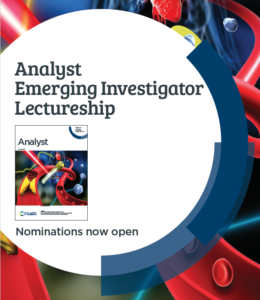
Now in it’s third cycle, the Analyst Emerging Investigator Lectureship is an excellent platform to recognize an early-career researcher in the analytical sciences. This biannual award was established in 2016 to raise the profile of the analytical sciences to the wider scientific community and general public. The winner of the 2018 Analyst Emerging Investigator Lectureship was Professor Wei Min from Columbia University. He received his award at the SciX 2018 meeting, where he also presented his plenary lecture.
Nominees will typically will be within 10 years of completing a PhD, although consideration will be given to candidates who have taken an alternate study or career path.The editorial team will screen each nomination for eligibility and draw up a shortlist of candidates based on the information provided by nominators. The recipient of the Lectureship will then be selected by the Analyst Editorial Board. The award winner will receive up to £2,000 towards travel costs to attend and present a lecture and will receive an invitation to contribute a review to Analyst in the following year.
Learn more and submit your nomination. The nomination deadline is February 29th, 2020.
Other 2019 and 2020 Lectureships
Keep an eye out for other lectureships and prizes throughout the year, as the calls for nominations and announcements vary by different journals. Here is some information on the other lectureships that the RSC offers and the typical timelines when you can expect to submit nominations.
Energy & Environmental Science Readers’ Choice Lectureship 2019
Recognizing and supporting those at an early stage of their independent career within the fields of energy and environmental sciences, the lectureship is a platform for early career researchers to showcase their research to the wider scientific community. Formerly based on the most-read articles within the journal in a given year, we are delighted to announce that from 2019, the EES Lectureship will be awarded through a nominations process, whereby nominations of candidates are invited from our fantastic community. The winner of the 2019 Lectureship will be announced in early 2020. The winner of the 2018 Energy & Environmental Science Readers’ Choice Lectureship was Professor Guo-Liang Chai from Fujian Institute of Research on the Structure of Matter (FJIRSM), Chinese Academy of Sciences (CAS).
PCCP Emerging Investigator Lectureship 2019 and 2020
Nominations were accepted in June and July of this year and the winner, who is decided at the fall Editorial Board meeting will be announced soon. Selected articles published by winners have been showcased in a special PCCP Emerging Investigator Lectureship themed collection. Look for next year’s call for nominations in the spring of 2020, and nominations are typically accepted throughout June and July before the winner is announced in the late fall or early winter.
Lab on a Chip/Dolomite Pioneers Lectureship 2019 and 2020
The “Pioneers of Miniaturization” Lectureship, sponsored by Dolomite and Lab on a Chip, is for early to mid-career scientists who have made extraordinary or outstanding contributions to the understanding or development of miniaturized systems. The winner of the 2019 “Pioneers of Miniaturization” Lectureship was announced in July of this year; the award was presented to Professor Hang Lu from Georgia Tech at the µTAS 2019 Conference, which was held in Basel, Switzerland, on October 27-31 2019. Look for the call for the 2020 Pioneers of Miniaturization Lectureship in early spring of 2020, typically accepting nominations in March-May.
Journal of Materials Chemistry Emerging Investigator Lectureship
The Journal of Materials Chemistry Emerging Investigator Lectureship winner is determined by the Editors-in-Chief of Journal of Materials Chemistry A, B, and C. The 2019 winner was announced on September 30th, 2019. Congratulations to Professor Qiang Zhang from Tsinghua University! Look for the call for nominations for the 2020 award in June and July of 2020.
MedChemComm Emerging Investigator Lectureship 2019
The recipient of the 2019 MedChemComm Emerging Investigator Lectureship was announced in March of this year; congratulations to Professor Amanda Hargrove from Duke University on winning the award. MedChemComm is undergoing a transformation! We are excited to announce that starting in 2020, the journal will be called RSC Medicinal Chemistry – a change that will allow the journal’s title to better reflect the content that it publishes – research articles and reviews, and not only communications. Look for more information on lectureships next year.
Natural Product Reports Emerging Investigator Lectureship 2019 and 2020
Nominations were open for the 2020 Natural Product Reports Emerging Investigator Lectureship in August and September 2019 and the winner will be announced in the late winter or early spring of 2020. The winner of the 2019 Natural Product Reports Emerging Investigator Lectureship was awarded to Professor Mohammad R. “Mo” Seyedsayamdost from Princeton University and he was presented with his award at the 2019 spring ACS Meeting in Orlando.
Comments Off on Awards, Prizes, and Lectureships: Open for Nominations
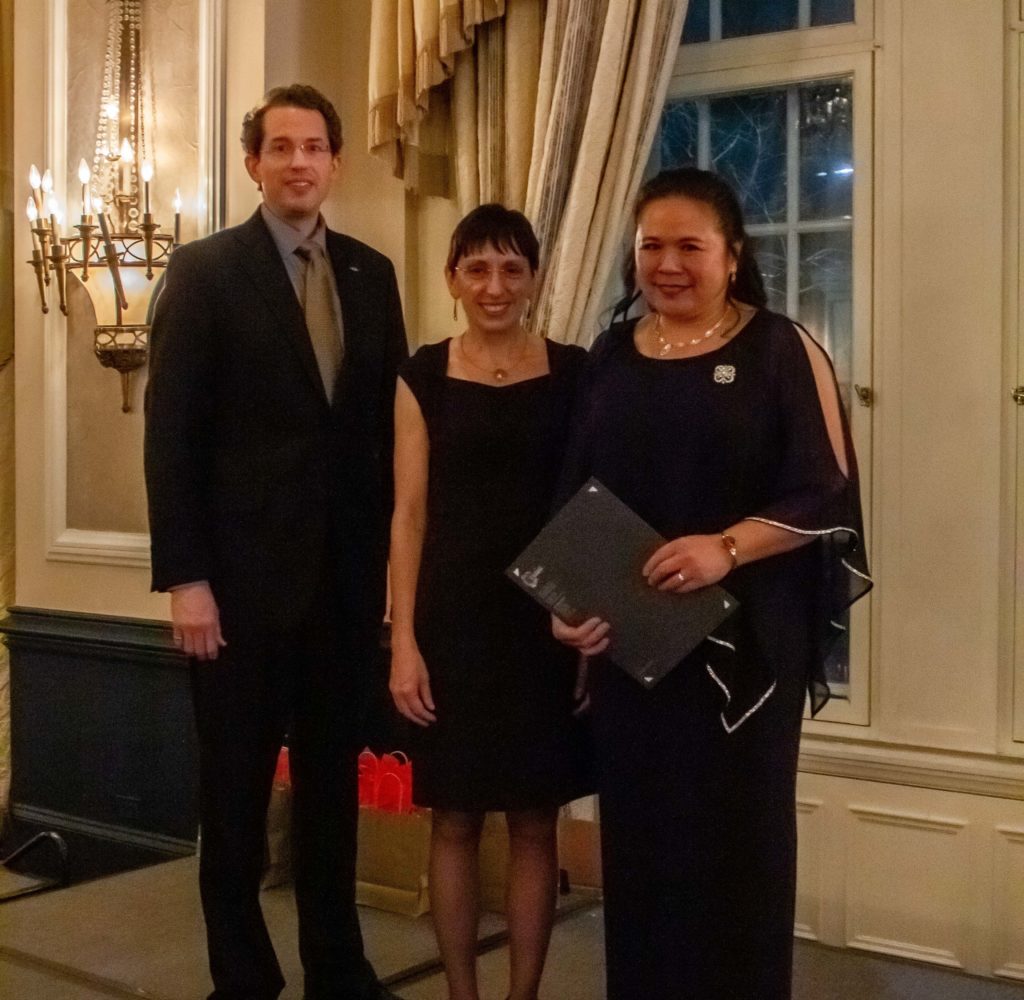
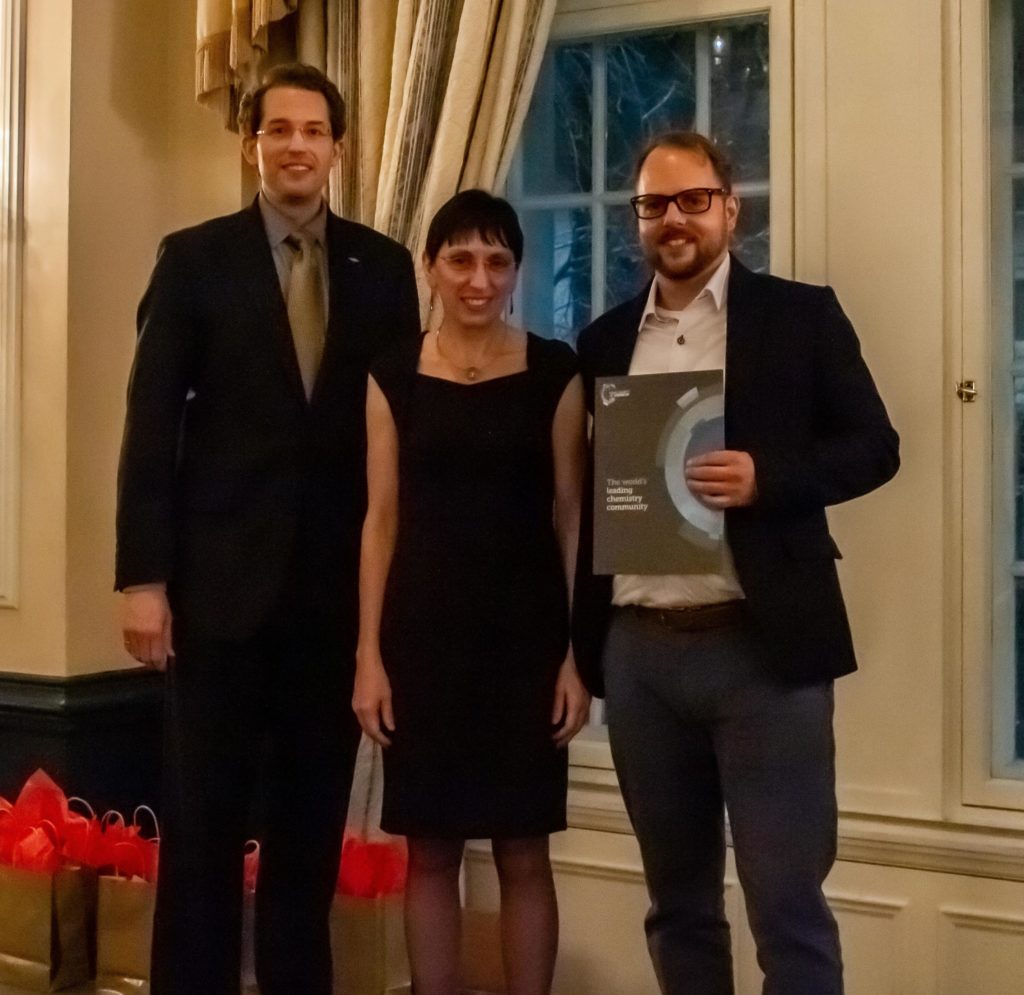

















 The JAAS Emerging Investigator Lectureship recognizes and supports an emerging scientist working in the area of atomic spectrometry in the early stages of their independent career. The winner of the
The JAAS Emerging Investigator Lectureship recognizes and supports an emerging scientist working in the area of atomic spectrometry in the early stages of their independent career. The winner of the 

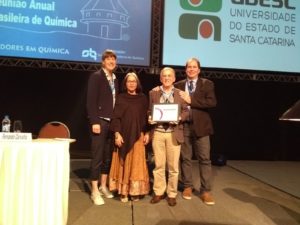
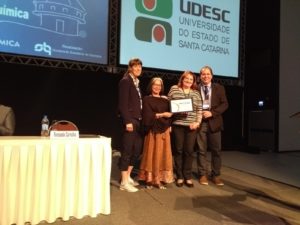
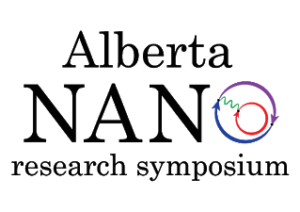
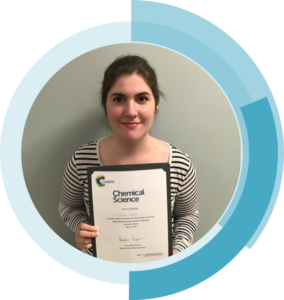

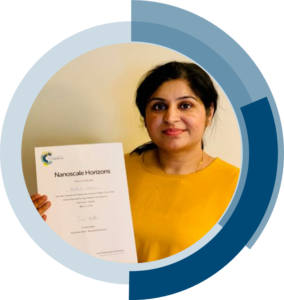
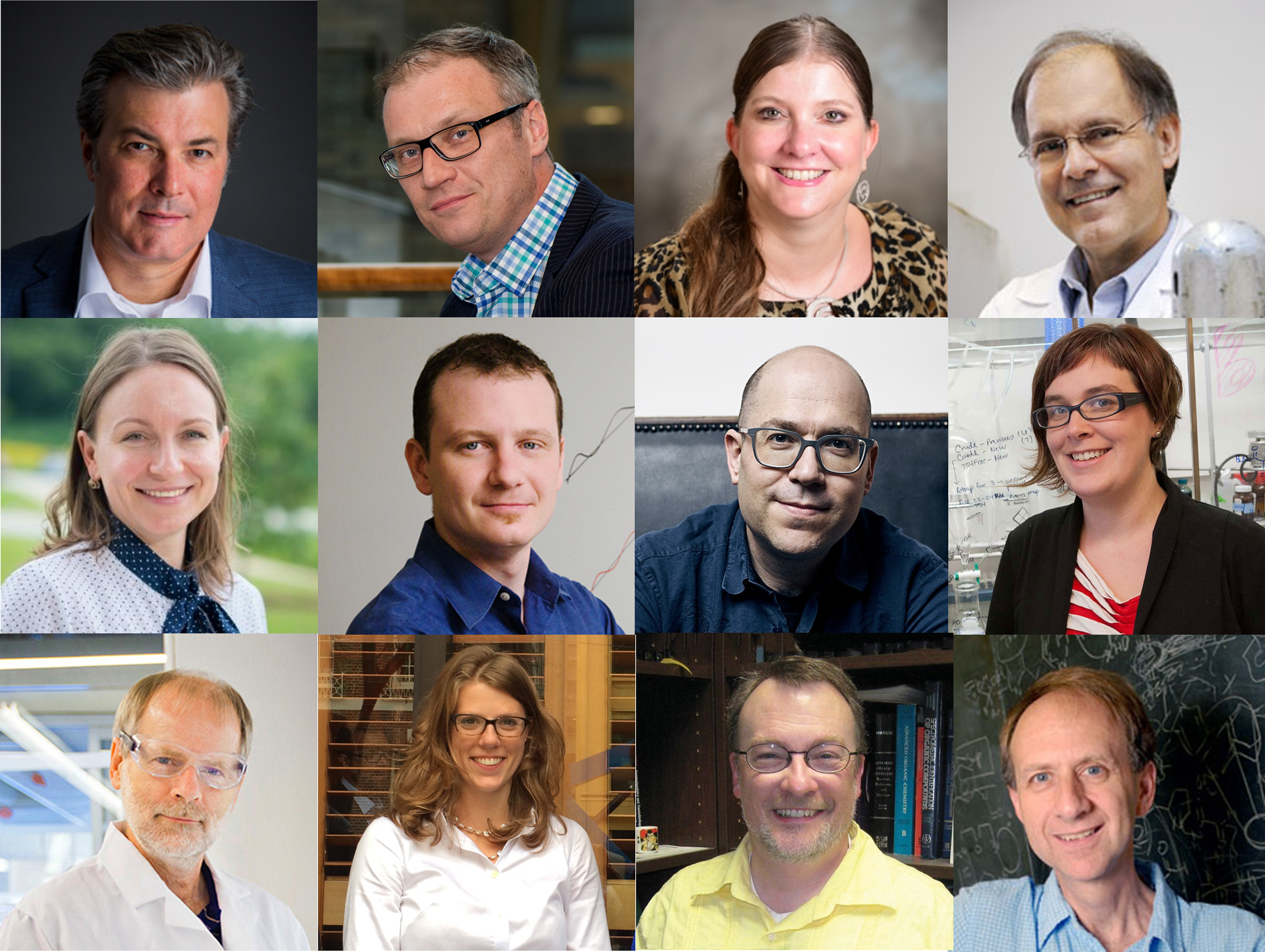
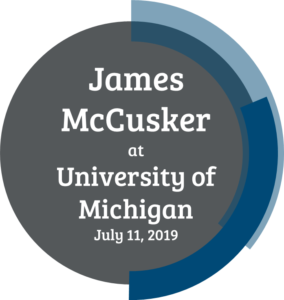
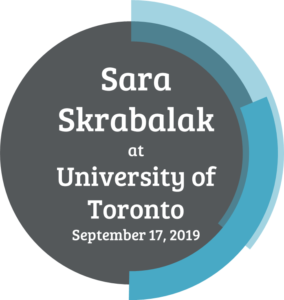 In September, Marika Wieliczko from our Washington, DC office will travel to Canada, where you can find many of our wonderful Board Members. Toronto is known as one of the most multicultural metropolitan areas in the world, with residents from all nations adding to the diversity of the city. Joining Marika in the provincial capital will be
In September, Marika Wieliczko from our Washington, DC office will travel to Canada, where you can find many of our wonderful Board Members. Toronto is known as one of the most multicultural metropolitan areas in the world, with residents from all nations adding to the diversity of the city. Joining Marika in the provincial capital will be 